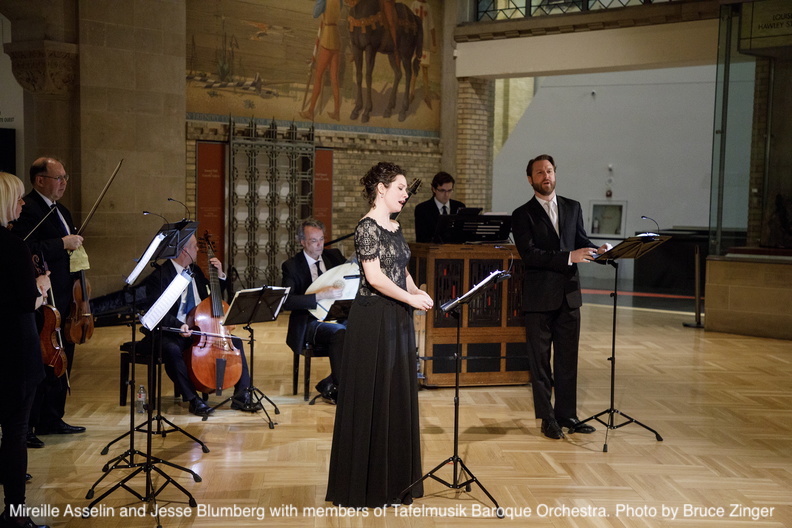Henry Purcell inhabited multiple worlds during his lifetime. Resident organist at Westminster Abbey. Tunesmith to London’s West End. Composer of religious set pieces and anthems for the English Church. Master of musical ceremonies at the court of William and Mary. The reverent and the regal, the sacred and the profane — it was all theatre to the supremely British Baroque multi-tasker.
Channeling the eternally vibrant spirit of the illustrious Restoration icon, Opera Atelier summoned Purcell to the Royal Ontario Museum late last week recreating the company’s historic 2017 concert offering — fittingly entitled Harmonia Sacra — as staged in the Royal Chapel at the Palace of Versailles. Repurposing ROM’s attractively renovated neo-Romanesque Samuel Hall Currelly Gallery as a credibly grand vaulted venue, the fluid 60-minute synthesis of music and dance glowed with expression, the brightness of the program brilliantly reinforced by a succession of dazzling performances. Voiced by soprano and baritone partnered by a trio of artists drawn from Atelier Ballet, all attended by a period chamber orchestra courtesy Tafelmusik, the evening was both salon and spectacle, intimately emotional, dramatically sweeping.
One of Purcell’s most enduring airs for the stage, Music for a While, text by John Dryden, opened the proceedings, the warmth and roundness of Jesse Blumberg’s immensely appealing instrument amply personifying the central conceit of the piece — music as soothing force of nature. Timbre and styling handsomely aligned, Blumberg gathered the tranquility of the closing passages around him, encountering costumed ballerina Juri Hiraoka as he exited. The ensuing moment captivated, singer and dancer in swirling synchronicity. The closeness of the interaction spoke of choreographer Jeanette Lajeunesse Zingg’s genius for fusing action to music.
Actively tracing the encounter, violins, viola, gamba, theorbo and organ continued their advance, slipping deeper into the Chaconne from King Arthur, Purcell’s colorful, rambunctious masque. The lively quasi Baroque jig that closes the semi opera received suitably upbeat treatment, joyfully danced by Hiraoka, Zingg and Tyler Gledhill.
Slowing the musical momentum, Purcell’s poignant Hosanna to the Highest with its resonant ground bass, movingly enunciated by a dynamic continuo section, stirred the soul, Blumberg’s polished tone exquisitely complimented by fellow singer Mireille Asselin’s sparkling, crystalline accents.
A pair of distinctly theatrical selections, the first extracted from Purcell’s précised setting of Shakespeare’s A Midsummer’s Night Dream recast as The Fairy Queen, the second an interlude from his opera, Dioclesian, offered a change of pace. A charming rondeau succeeded by a congenial little country dance enchanted.
Close thine eyes: Upon a Quiet Conscience followed, a sacred, bittersweet inspirational duet touchingly sung by Asselin and Blumberg, their voices curling and twining in restless contemplation, each ultimately achieving repose. The pair’s command of harmony and counterpoint electrified — a soaring prayer for peace, a hymn for hope.
A typically bubbly Purcellian sonata, instantly arresting, the concluding movement played with particularly pointed engagement by the entire ensemble, brought the evening to the edge of Harmonia Sacra’s startling finale.
Crossing to the centre of the long unbounded playing area, Mireille Asselin conveyed the composer’s impassioned devotional piece, The Blessed Virgin’s Expostulation — more aria than song — to the centre of our consciousness, delivering a powerful, intensely personalized reading of Mary’s lament. Wielding bold, decidedly operatic strokes, Purcell, in collaboration with lyricist Nahum Tate — librettist, Dido and Aeneas — universalizes a mother’s suffering. Asselin tore at our emotions, vividly inhabiting the Virgin’s pain on discovering her precious child is missing. Appearing as the archangel Gabriel, Tyler Gledhill danced a tender, heavenly response to Mary’s desperate plea for support. Where does my soul’s sweet Darling stay? The knowledge that Jesus is safe, preaching to the Elders in the Temple, is yet to be revealed.
The ensuing work, Inception, a new contemporary cantata commissioned by Opera Atelier — poetry by Rilke yet to be incorporated — cast a haunting, transcendental spell over the hushed hall. Composer Edwin Huizinga mesmerized, soloing on wandering, folk-inflected violin, crisp arpeggios ringing through the museum galleries beyond, Gledhill mirroring the sense of a new beginning in tumbled mime and movement.
The sweetness and serenity of Purcell’s Evening Hymn brought this evening to a close.
There are times, exceedingly precious, when a concert redefines perception, when performance touches the heart, when music is heard with eyes as well as ears. Harmonia Sacra was one of them. A magical experience. Wondrous. Sublime.


